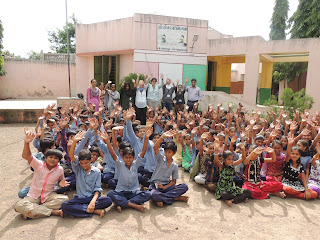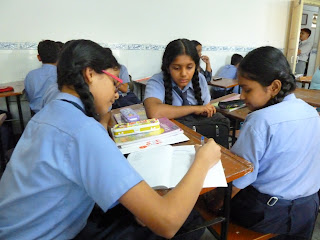This blog is
dedicated to Andreas, a friend from school, who sadly died on Sunday in a
gliding plane accident. You are missed!
Andreas’ motto was “Yesterday
is history, tomorrow is a mystery, today is a gift - that's why it's called
present”, so in this spirit, I’ll today tell you some more about our
experiences visiting the local schools as part of our CSC project.
Working with the Essar foundation, our project objective is to
improve English capability at government schools in local villages around the Jamnagar refinery. The
foundation engages in a number of activities to improve the standard and
quality of living in these villages but so far had not had the opportunity to
concentrate on education. With our help they hope to change this and – given
that English is more and more important in order to find employment – had asked
us to assess the current level of English and develop recommendations on how to
improve this.
Throughout the last week we have been visiting as many local
schools as possible and were able to talk to teachers, headmasters and
students.
While the schools may look very similar from the outside
(see picture below),
no one school is the same and there is a great variety in
the children’s education, e.g
- Some schools have to run “shifts”, as there are not enough classrooms (and/or teachers) available which means that the teachers have to give lessons from 7.30 in the morning to 5.30 in the evening;
- Sometimes, 70 children are taught by one teacher while in other schools one teacher looks after 25 children;
- We were also surprised to see that some schools have really well equipped IT labs with internet access and videoconferencing facilities
What was similar in almost every school we visited so far is
the energy and enthusiasm of the teachers and students. The students seemed
like sponges soaking up any new learning and piece of information. Although the
learning conditions are more than basic (with most classrooms lacking chairs
& desks), the students were very engaged and sooooooooo eager to learn, it
was unbelievable.
With regards to English, the situation seems dire. We often
learned that there either was no English teacher (so the other teachers try their
best to teach English based on the books provided, without actually having an
understanding of the language) or were introduced to English teachers who
hardly spoke or understood the language. English also seems to be – besides
maths – the subject the children struggle with most, part of the reason being
that it’s only introduced in 5th grade and with it, the Latin
alphabet (until then, the children read and write in Hindi/Gujarati).
We also looked at the local communities surrounding the
schools and almost everywhere the support and value for education seems to be
an issue. In many cases, parents are illiterate or have only attended 4 or 5
years of school and therefore can’t support their children with their studies
(let alone English). In addition, many parents rely on their eldest children to
take care of the younger ones, so daughters frequently drop out of school (and
in some Muslim communities, women are not allowed to continue to study beyond
the age of 12).
On the good news front though, we heard that most village
elders are very supportive of the schools and stress the value of education
within the community. So in some – typically comparatively affluent – villages,
the drop out rates have decreased in recent years and a high percentage of
students (both boys and girls) are able to continue their education beyond 8th
grade (which is when the mandatory education at government schools ends and students typically need to go to a school
outside their home village to continue their studies). There are also government
programmes which provide children with bikes, where the nearest 9/10th
grade school is not in walking distance and a number of organisations (such as
the foundation), are providing additional support and scholoarships for
students.
Also, we were encouraged to find a number of “beacons” where
an individual teacher or school had done some amazing work, completely
self-motivated, to improve learning and education (e.g. by running after-school
clubs, using games and songs to teach English or experimenting with other fun
activities to make learning a better experience).
This afternoon we were invited to visit the local public
school and thought we’d arrived at another planet. Education there is amazing –
every subject is taught in English from pre-school using latest methodology and techniques, the students have a 50% say
in their education (the other 50% is decided by the school board) and the whole
atmosphere was full of energy and passion for education & learning.
Wow – we are still completely amazed by the experience and
now even more keen to make a difference to the government schools, seeing what
can be achieved by the right setting!
Based on the school visits and talking to our colleagues from
the foundation, we’ve already come up with some initial ideas on what could be
done to address the issues we saw and will add to this over the coming weeks.
If you have any ideas and suggestions, please send these across as well (maybe
some of you have worked as English teachers abroad or know of projects that
help deprived schools etc.?).
We’ll continue with more visits this week (as the schools
will be closed next week due to a national holiday on the 28th) and
I’ll keep you posted on our progress.
We are also starting to plan what we’ll do over the weekend
and it looks as if we’ll do some “temple-spotting”; so watch this space for
some updates on this (as well as some insight into the Indian way to do
shopping – quite different from what I’ve ever experienced).








So sorry to read of Andreas' premature passing.
ReplyDeleteThe enthusiasm you are encountering is amazing; many UK based teachers would envy such knowledge hungry charges!
Q: to what extent are childrens' books in evidence? I remember reading "Asterix The Gaul" cartoon books when learning French. I just wondered if fun / cartoon type based story books would be appropriate as a means to help supplement English based material - whilst still keeping a fun side to the reading input?
Enjoy the temple spotting - and don't shop too much. ' hope tummy better now and mosquitoes less voracious? Mark